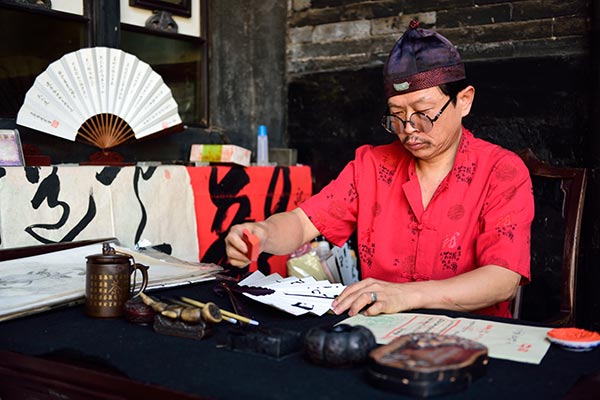Gods and goddesses share sacred mountain
 |
|
Rishengchang exchange shop at Pingyao. [Photo by Deepankar Aron/ For chinadaily.com.cn] |
During the eastern Han dynasty (AD 25-220), under the Ming emperor's reign in particular, Buddhism started spreading in China. It was at the emperor’s invitation that two famous Indian monks — Dharmaratna and Kasyapa Matanga — visited Luoyang around AD 67, leading to the commissioning of the first Buddhist temple, where Buddhist scriptures were translated from Sanskrit into Chinese. According to legend, the main mountain in the Wutai Mountain area is also called Ling-jiu (ling meaning "your dreams becoming true" and jiu referring to a bird), because it resembles the famous sacred mountain called Vultures Peak at Rajgir in the northern province of Bihar in India, where Buddha preached the Lotus Sutra and where the first major Buddhist conclave was held.
Buddha's teeth are treasured relics, sent by Indian King Ayuwang to China, which found their way into this temple. I clarify for our guide the Indian name of Ayuwang — Ashoka, the great — who was the Indian emperor around 250 BC. After a bloody war fought at Kalinga, in the province of Orissa in India, the king not only adopted Buddhism and nonviolence, but also spread the message of peace and harmony to much of Asia. He sent several relics of Buddha to different parts of Asia, quite a few of which came to China and to this temple in particular.
Wutai Mountain is one of the four most holy mountains in Chinese Buddhism. It is home to the Buddhist Goddess known as Majushri in Sanskrit, the ancient Indian language, or Wenshu in Chinese. She is the goddess of learning, also famous as Saraswati in India. She has a Japanese incarnation too. I remember having seen her as the main goddess in a temple in Miyajima near the famous floating Tori of Japan. Her pose mounted on a lion with a sword in her hand is strikingly similar to the Indian goddess Durga, another form of Saraswati.
The other three holy mountains in China are Emei Mountain in Sichuan, Putuo Mountain near Shanghai and Jiuhua Mountain in Anhui province. Emei Mountain is home to the form of Buddha called the Puxian in Chinese or Samantabhadra in Sanskrit, considered to be the Bodhisattva of truth. Putuo Mountain is home to the famous Bodhisattva called Guanyin in Chinese or Avalokiteshwara in Sanskrit, who is the goddess of mercy with a thousand hands to help the needy. Jiuhua Mountain is home to Di Zang in Chinese or Ksitigarbha in Sanskrit, the god of filial piety, as well as the rescuer of all from hell to heaven.














